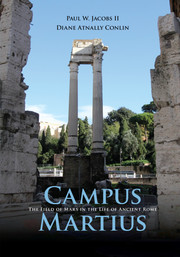Book contents
- Frontmatter
- Contents
- Illustrations
- Acknowledgments
- Maps
- Introduction: “This Place Was Holiest of All”
- Chapter One “The Size of the Plain Is Remarkable”: Defining the Limits of the Campus Martius in Time and Space
- Chapter Two Gathering Troops in the War God's Field
- Chapter Three “Very Costly Temples”: The Campus Martius and Republican Temple Construction
- Chapter Four “Chariot Races,” “Three Theatres,” “An Amphitheatre,” and More: Entertainment in the Campus Martius
- Chapter Five “Colonnades about It in Very Great Numbers”: The Porticoes of the Campus Martius
- Chapter Six Between the Aqua Virgo and the Tiber: Water and the Field of Mars
- Chapter Seven “A Zeal for Buildings”: Reshaping of the Space by the Emperors
- Conclusion: “The Rest of the City a Mere Accessory”
- Appendix A Chronology of Development in the Campus Martius to the Early Fourth Century c.e.
- Appendix B Glossary of Architectural Terms
- Notes
- Selected Bibliography
- Index
- Plate Section
Chapter Six - Between the Aqua Virgo and the Tiber: Water and the Field of Mars
Published online by Cambridge University Press: 18 December 2014
- Frontmatter
- Contents
- Illustrations
- Acknowledgments
- Maps
- Introduction: “This Place Was Holiest of All”
- Chapter One “The Size of the Plain Is Remarkable”: Defining the Limits of the Campus Martius in Time and Space
- Chapter Two Gathering Troops in the War God's Field
- Chapter Three “Very Costly Temples”: The Campus Martius and Republican Temple Construction
- Chapter Four “Chariot Races,” “Three Theatres,” “An Amphitheatre,” and More: Entertainment in the Campus Martius
- Chapter Five “Colonnades about It in Very Great Numbers”: The Porticoes of the Campus Martius
- Chapter Six Between the Aqua Virgo and the Tiber: Water and the Field of Mars
- Chapter Seven “A Zeal for Buildings”: Reshaping of the Space by the Emperors
- Conclusion: “The Rest of the City a Mere Accessory”
- Appendix A Chronology of Development in the Campus Martius to the Early Fourth Century c.e.
- Appendix B Glossary of Architectural Terms
- Notes
- Selected Bibliography
- Index
- Plate Section
Summary
To Vergil, it was the majestic “Father Tiber”; to Statius, the “prince of rivers”; to Dionysius Periegetes, the “most kingly of rivers”; and to Martial, the “sacred Tiber.” Encapsulating these ancient assessments, a recent study describes the Tiber as the “center of traditional stories of the foundation of Rome in which it appeared as a benevolent collaborator.” The great river carried the basket bearing the twins Romulus and Remus as well as the sacred grain of Tarquinius Superbus that formed the Tiber Island. For Romans it was both source and receptacle of divine power. In Vergil's Aeneid, the river's associated god Tiberinus appeared to Aeneas and prophesized the future site of Rome along the river's banks. Sacred springs such as the Cati fons drained into the Tiber (by way of the Petronia Amnis and other rivulets), and Ovid wrote that nymphs and naiads haunted the river's shoreline.
Occasionally, the Tiber overflowed its banks, and while Plutarch wrote that citizens regarded one of its highest floods, which occurred during the brief reign of Otho, as a “baleful sign,” this was not always so. Interpreting the Tiber's floodwaters in 27 b.c.e. as a positive omen, soothsayers prophesized that Augustus would “hold the whole city under his sway.” For much of the year, however, the river remained safely contained within its banks. Pliny the Elder described the Tiber as the “tranquillest purveyor of the produce of the whole globe.” Livy wrote that it carried on its placid surface the “fruit of inland places” and the “seaborne produce from abroad,” and as Juvenal recorded, the river brought the languages and customs of distant countries to the capital. In places the current flowed calmly enough to allow swimming. Cato the Elder taught his son to swim in the Tiber, and soldiers would take a dip following military exercises. Generally praised in the ancient sources, the Tiber nevertheless had its more dangerous side. The Tiber's heavy winter flows not only led to the often destructive flooding of low-lying areas of the city but also likely contributed to the presence in the late summer and fall of “tertian fever,” a malady known today as malaria.
- Type
- Chapter
- Information
- Campus MartiusThe Field of Mars in the Life of Ancient Rome, pp. 112 - 137Publisher: Cambridge University PressPrint publication year: 2015



